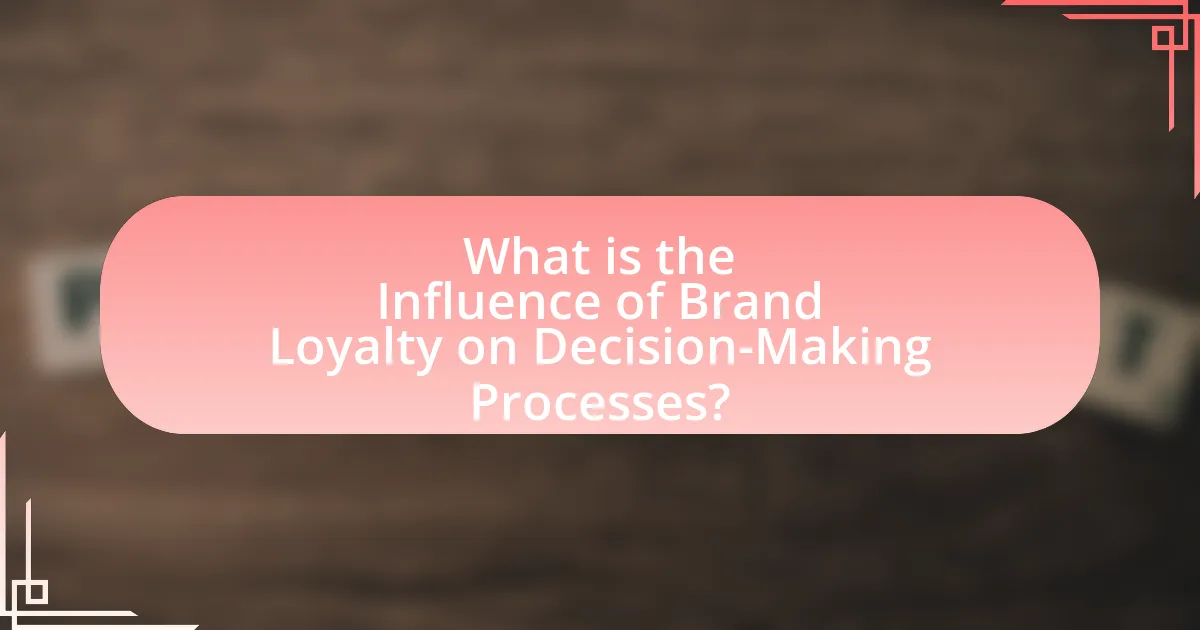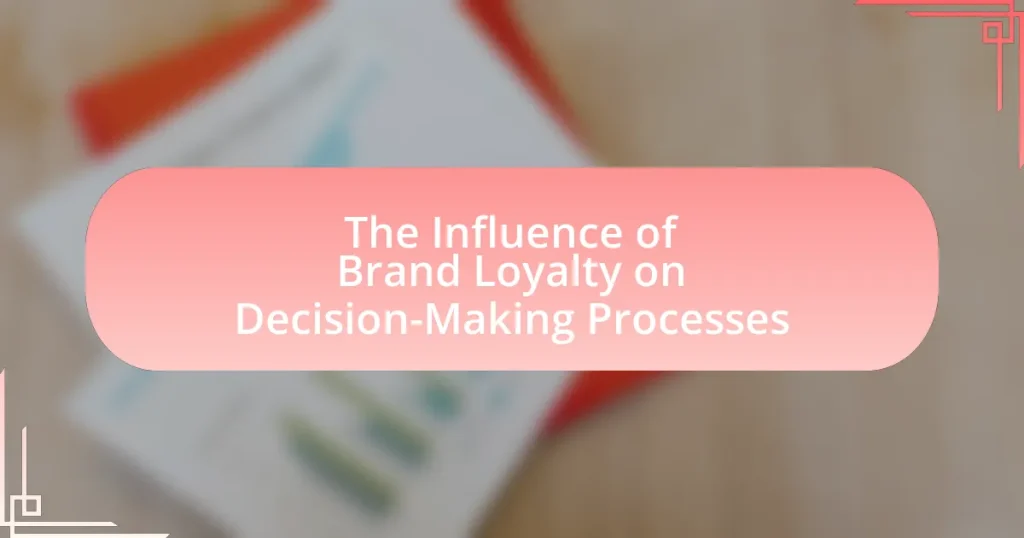Brand loyalty plays a crucial role in shaping consumer decision-making processes by fostering preferences for familiar brands and reducing the cognitive load associated with evaluating alternatives. This article explores how brand loyalty influences consumer behavior, including repeat purchases and willingness to pay a premium for trusted brands. It examines the psychological factors contributing to loyalty, such as emotional attachment and perceived value, and discusses the importance of customer experience and cultural influences on brand perception. Additionally, the article outlines practical strategies for brands to cultivate and maintain loyalty, emphasizing the significance of personalized experiences and effective loyalty programs.

What is the Influence of Brand Loyalty on Decision-Making Processes?
Brand loyalty significantly influences decision-making processes by creating a preference for familiar brands over alternatives. This preference often leads consumers to choose a brand they trust, even when faced with competing options. Research indicates that 70% of consumers are more likely to purchase from brands they are loyal to, demonstrating that brand loyalty can streamline decision-making by reducing the cognitive load associated with evaluating multiple choices. Additionally, loyal customers are more likely to overlook negative information about their preferred brands, further solidifying their purchasing decisions.
How does brand loyalty shape consumer behavior?
Brand loyalty significantly shapes consumer behavior by influencing repeat purchases and brand preference. Consumers who exhibit brand loyalty are more likely to choose a familiar brand over competitors, even when faced with alternatives that may offer better pricing or features. Research indicates that loyal customers are willing to pay a premium for their preferred brands, with studies showing that 66% of consumers are willing to switch brands if they feel a competitor offers a better experience, yet 77% of consumers remain loyal to brands that provide excellent service. This loyalty leads to increased customer retention, higher lifetime value, and positive word-of-mouth referrals, reinforcing the brand’s market position.
What psychological factors contribute to brand loyalty?
Psychological factors that contribute to brand loyalty include emotional attachment, perceived value, and trust. Emotional attachment occurs when consumers develop a strong connection to a brand, often influenced by positive experiences or brand storytelling. Perceived value refers to the consumer’s assessment of the benefits received from a brand compared to its cost, which can enhance loyalty when the perceived value is high. Trust is built through consistent quality and reliability, leading consumers to prefer a brand over competitors. Research indicates that emotional attachment can increase brand loyalty by up to 50%, highlighting its significance in consumer decision-making processes.
How does brand loyalty affect purchasing decisions?
Brand loyalty significantly influences purchasing decisions by creating a preference for specific brands over competitors. Consumers who exhibit brand loyalty are more likely to choose familiar brands, often prioritizing them even when alternatives are available. Research indicates that loyal customers are willing to pay a premium for their preferred brands, with studies showing that brand loyalty can increase sales by up to 10 times compared to non-loyal customers. This preference is driven by emotional connections, perceived quality, and trust established through consistent positive experiences with the brand.
Why is brand loyalty important in marketing strategies?
Brand loyalty is crucial in marketing strategies because it leads to repeat purchases and customer retention, which significantly reduces marketing costs. Loyal customers are more likely to choose a brand over competitors, even in the face of price increases, as evidenced by a study from Bain & Company showing that increasing customer retention rates by just 5% can increase profits by 25% to 95%. This demonstrates that brand loyalty not only enhances customer lifetime value but also fosters positive word-of-mouth, further amplifying a brand’s market presence and profitability.
What role does brand loyalty play in customer retention?
Brand loyalty significantly enhances customer retention by fostering a strong emotional connection between consumers and a brand. This connection leads to repeat purchases, as loyal customers are more likely to choose a familiar brand over competitors, even in the face of price increases or alternative options. Research indicates that acquiring a new customer can cost five to twenty-five times more than retaining an existing one, highlighting the financial benefits of brand loyalty in maintaining a stable customer base. Additionally, a study by Bain & Company found that increasing customer retention rates by just 5% can lead to an increase in profits of 25% to 95%, underscoring the critical role brand loyalty plays in sustaining long-term customer relationships.
How can brands cultivate loyalty among consumers?
Brands can cultivate loyalty among consumers by consistently delivering high-quality products and exceptional customer service. This approach fosters trust and satisfaction, which are critical components of consumer loyalty. Research indicates that 70% of consumers are more likely to remain loyal to a brand that provides excellent customer service (Zendesk, 2020). Additionally, brands that engage with their customers through personalized marketing and loyalty programs can enhance emotional connections, further solidifying loyalty. For instance, a study by Accenture found that 83% of consumers are willing to share their data for personalized experiences, demonstrating the importance of tailored interactions in building brand loyalty.

What are the key factors influencing brand loyalty?
Key factors influencing brand loyalty include product quality, customer service, brand reputation, emotional connection, and perceived value. Product quality ensures customer satisfaction and repeat purchases, as evidenced by a study from the Journal of Marketing Research, which found that 70% of consumers cite quality as a primary reason for brand loyalty. Customer service plays a crucial role; research by Zendesk indicates that 87% of customers are willing to pay more for better service. Brand reputation, shaped by consumer experiences and reviews, significantly impacts loyalty, with a Nielsen report showing that 92% of consumers trust recommendations from friends and family over advertising. Emotional connection fosters loyalty, as brands that resonate emotionally with consumers can achieve a 306% higher lifetime value, according to a study by Motista. Lastly, perceived value, which encompasses the benefits received relative to the cost, directly influences loyalty, with a study from the Harvard Business Review highlighting that customers who perceive high value are 6 times more likely to remain loyal.
How do emotional connections impact brand loyalty?
Emotional connections significantly enhance brand loyalty by fostering a sense of trust and attachment between consumers and brands. When consumers feel emotionally connected to a brand, they are more likely to choose that brand over competitors, even in the face of price differences. Research by the Harvard Business Review indicates that emotionally connected customers are more than twice as valuable as highly satisfied customers, as they exhibit higher retention rates and increased spending. This emotional bond leads to repeat purchases and positive word-of-mouth, reinforcing brand loyalty and influencing decision-making processes in favor of the brand.
What are the benefits of emotional branding?
Emotional branding enhances customer loyalty by creating strong emotional connections between consumers and brands. This connection leads to increased brand preference, as emotionally engaged customers are more likely to choose a brand over competitors. Research indicates that emotionally connected customers are 52% more valuable than those who are just satisfied, as they tend to exhibit higher levels of loyalty and advocacy. Additionally, emotional branding can drive higher sales, with brands that effectively engage consumers emotionally experiencing a 23% increase in sales compared to those that do not.
How do consumers perceive brand values?
Consumers perceive brand values as the beliefs and principles that a brand represents, which significantly influence their purchasing decisions. This perception is shaped by factors such as brand reputation, quality, and emotional connection. For instance, a study by Aaker (1996) highlights that consumers associate strong brands with higher perceived value, leading to increased loyalty and preference. Additionally, research from Keller (2001) indicates that consumers often evaluate brand values based on their alignment with personal values, further reinforcing the importance of brand identity in decision-making processes.
What role does customer experience play in brand loyalty?
Customer experience is crucial in fostering brand loyalty, as positive interactions enhance customer satisfaction and emotional connections. Research indicates that 73% of consumers say that a good experience is key to influencing their brand loyalty. When customers feel valued and understood through personalized service and seamless interactions, they are more likely to return and recommend the brand to others. This loyalty translates into repeat purchases and long-term relationships, ultimately driving revenue growth for the brand.
How can brands enhance customer experience to build loyalty?
Brands can enhance customer experience to build loyalty by personalizing interactions and providing exceptional service. Personalization, such as tailored recommendations based on customer preferences, has been shown to increase customer satisfaction and retention; for instance, a study by Epsilon found that 80% of consumers are more likely to make a purchase when brands offer personalized experiences. Additionally, exceptional service, including prompt responses to inquiries and resolving issues efficiently, fosters trust and encourages repeat business. According to a report by Zendesk, 87% of customers believe that brands need to put more effort into providing a consistent customer experience. By focusing on these strategies, brands can effectively enhance customer experience and cultivate loyalty.
What are the consequences of poor customer experience on loyalty?
Poor customer experience significantly undermines brand loyalty. When customers encounter negative experiences, such as inadequate service or product quality, they are more likely to switch to competitors. Research indicates that 86% of buyers are willing to pay more for a better customer experience, highlighting the direct correlation between experience and loyalty. Furthermore, a study by the Harvard Business Review found that customers who have a negative experience are 4 times more likely to churn than those who have a positive experience. This data underscores that poor customer experiences lead to decreased loyalty, ultimately affecting a brand’s long-term success and profitability.

How does brand loyalty affect decision-making processes in different demographics?
Brand loyalty significantly influences decision-making processes across various demographics by shaping consumer preferences and reducing the perceived risk associated with purchases. For instance, younger consumers often exhibit strong brand loyalty towards technology brands, which leads them to prioritize familiar brands over alternatives, thereby streamlining their decision-making process. In contrast, older demographics may show loyalty to established brands in sectors like food and personal care, where trust and reliability are paramount, influencing their choices towards brands they have used for years. Research indicates that 70% of consumers are more likely to recommend a brand they are loyal to, highlighting how brand loyalty can create a sense of community and influence purchasing decisions across different age groups and cultural backgrounds.
What differences exist in brand loyalty across age groups?
Brand loyalty varies significantly across age groups, with younger consumers typically exhibiting lower loyalty compared to older consumers. Research indicates that millennials and Gen Z are more likely to switch brands based on price, trends, and social media influence, while older generations, such as baby boomers, tend to remain loyal to brands they have trusted over time. A study by McKinsey & Company found that 70% of older consumers are loyal to brands they have used for years, whereas only 30% of younger consumers express similar loyalty. This difference is attributed to varying values, with younger consumers prioritizing innovation and social responsibility, while older consumers value reliability and tradition.
How do millennials approach brand loyalty compared to older generations?
Millennials approach brand loyalty with a focus on authenticity and social responsibility, contrasting with older generations who often prioritize brand familiarity and reliability. Research indicates that 66% of millennials are willing to pay more for brands that demonstrate social responsibility, highlighting their preference for brands that align with their values. In contrast, older generations tend to remain loyal to brands they have trusted over time, often valuing consistency and quality over ethical considerations. This shift in loyalty dynamics reflects broader changes in consumer behavior, where millennials seek deeper connections with brands that resonate with their personal beliefs and lifestyle choices.
What factors influence brand loyalty among Gen Z consumers?
Brand loyalty among Gen Z consumers is influenced by authenticity, social responsibility, and digital engagement. Authenticity is crucial, as Gen Z values brands that are transparent and genuine in their messaging; a study by McKinsey found that 70% of Gen Z consumers prefer brands that align with their personal values. Social responsibility also plays a significant role, with 54% of Gen Z willing to pay more for sustainable products, according to a report by Deloitte. Additionally, digital engagement is vital, as this generation is highly connected online; brands that effectively utilize social media and interactive content can foster stronger loyalty.
How does cultural background influence brand loyalty?
Cultural background significantly influences brand loyalty by shaping consumer values, preferences, and behaviors. For instance, individuals from collectivist cultures often prioritize community and family-oriented brands, leading to stronger loyalty towards brands that reflect these values. Research by Aaker and Maheswaran (1997) indicates that cultural dimensions, such as individualism versus collectivism, directly affect brand perception and loyalty. In collectivist societies, brands that emphasize social harmony and group identity tend to foster deeper emotional connections, resulting in higher loyalty levels. Conversely, in individualistic cultures, personal achievement and self-expression drive brand loyalty, as consumers gravitate towards brands that enhance their personal identity. This cultural influence on brand loyalty underscores the importance of aligning marketing strategies with cultural values to effectively engage consumers.
What are the implications of cultural differences on brand perception?
Cultural differences significantly impact brand perception by shaping consumer attitudes and behaviors towards brands. For instance, a study by Hofstede identified dimensions of culture, such as individualism versus collectivism, which influence how consumers relate to brands; in collectivist cultures, brands that emphasize community and family resonate more positively. Additionally, research published in the Journal of International Marketing indicates that cultural values affect brand loyalty, as consumers in different cultures may prioritize varying attributes like quality, status, or emotional connection. These cultural nuances can lead to divergent brand perceptions, affecting marketing strategies and brand positioning across global markets.
How can brands adapt their strategies to diverse cultural contexts?
Brands can adapt their strategies to diverse cultural contexts by conducting thorough market research to understand local customs, values, and consumer behaviors. This approach allows brands to tailor their messaging, product offerings, and marketing channels to resonate with specific cultural nuances. For instance, McDonald’s successfully modifies its menu items in different countries, such as offering vegetarian options in India, reflecting local dietary preferences. This strategy not only enhances brand loyalty but also increases market penetration, as evidenced by McDonald’s achieving over 50% of its sales from international markets in 2022. By aligning their strategies with cultural contexts, brands can foster deeper connections with consumers, ultimately influencing their decision-making processes.
What practical strategies can brands implement to enhance loyalty?
Brands can enhance loyalty by implementing personalized customer experiences. Personalization fosters a deeper emotional connection, as studies show that 80% of consumers are more likely to make a purchase when brands offer personalized experiences. Additionally, loyalty programs that reward repeat purchases can significantly increase customer retention; for instance, businesses with effective loyalty programs can see a 5-10% increase in sales. Engaging customers through consistent communication and feedback mechanisms also strengthens loyalty, as brands that actively listen to their customers can adapt their offerings to better meet consumer needs, leading to higher satisfaction and loyalty rates.
How can loyalty programs be designed to maximize engagement?
Loyalty programs can be designed to maximize engagement by incorporating personalized rewards, gamification elements, and seamless user experiences. Personalized rewards, such as tailored discounts or exclusive offers based on customer preferences, enhance relevance and encourage participation. Gamification elements, like point systems or challenges, create an interactive experience that motivates customers to engage more frequently. Additionally, a seamless user experience across platforms, including mobile apps and websites, ensures that customers can easily access and utilize their rewards, fostering ongoing interaction. Research indicates that personalized marketing can increase engagement rates by up to 20%, demonstrating the effectiveness of these strategies in loyalty program design.
What are the best practices for maintaining brand loyalty over time?
To maintain brand loyalty over time, companies should prioritize consistent quality, engage with customers, and personalize experiences. Consistent quality ensures that customers receive reliable products or services, fostering trust and satisfaction. Engaging with customers through regular communication, feedback solicitation, and community-building initiatives strengthens emotional connections. Personalization, achieved through tailored marketing and customized offerings, enhances customer relevance and satisfaction. Research indicates that brands that effectively engage and personalize experiences can see loyalty rates increase by up to 30%, demonstrating the effectiveness of these practices in cultivating long-term brand loyalty.


